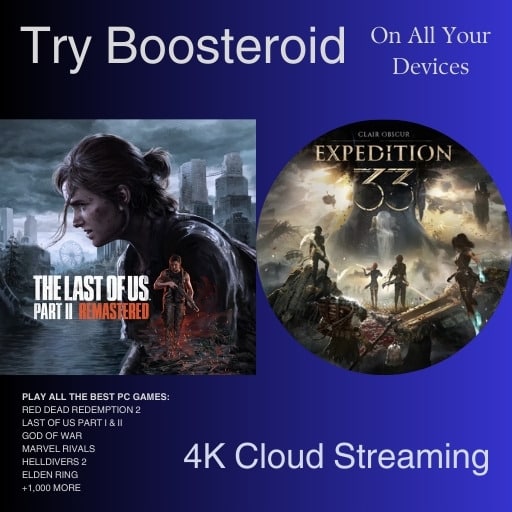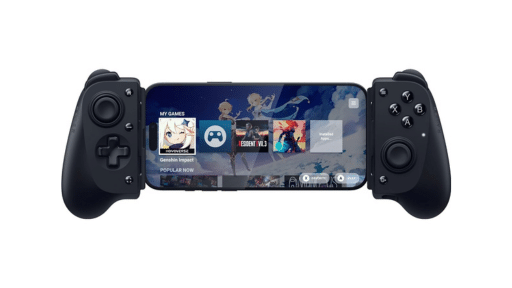
I’ve always had mixed feelings about emotional indie games. Sometimes they try too hard to make you feel something, and it shows. But Koira didn’t feel like it was performing. It just quietly pulled me in and let its story unfold without a word.
Developed by Studio Tolima, and published by DON’T NOD, Koira is a short narrative puzzle adventure where you guide a forest spirit and a mysterious puppy on a journey through snow-covered wilderness. It’s a quiet game built on small moments—throwing a stick, singing a melody, hiding in the trees. There’s no dialogue, no text, and no overt explanation. Instead, every interaction is communicated through movement, sound, and music.
You travel downhill toward an uncertain home, solving light puzzles, escaping danger, and sharing the road with your unlikely companion. It’s an emotional journey, but not because the game pushes big story beats or dramatic reveals. The weight comes from subtle shifts—how the dog reacts, how the music changes, how the environment responds as you move forward.
Koira is brief, no more than a few hours, and its mechanics are simple. But the focus isn’t on challenge. It’s on connection. And whether you’re someone who’s grown up with pets or just enjoy quiet, reflective adventures, this one might surprise you with how quickly it gets under your skin.
A Wordless Journey with Meaning
You start Koira without any instructions. No dialogue, no text—just a cold forest and an unsure beginning. After a few steps, you find a puppy stuck in a trap. You free it, and from there, the two of you move forward together. The story unfolds through simple actions—walking together, calling out, helping each other during trouble. It builds quietly but never feels empty.
As you travel, you explore woods, ruins, and strange landmarks while dodging hunters and figuring out what this world actually is. Nothing is explained directly. A few events shift the tone fast and force you to protect your companion in ways you might not be ready for. The path feels unpredictable at times, but that’s part of what makes the relationship work—you react together, without always knowing what’s coming.
There’s a moment when the dog becomes afraid of you. It caught me off guard. Not because anything scary happened, but because I didn’t realize how much I cared about earning that trust back. It’s rare to see something that quiet hit that hard.
Koira keeps things simple, but it’s not aimless. It’s about what happens between you and the dog when fear, trust, and connection are all in play. The game doesn’t tell you what to feel or why. It just lets each moment land on its own. And for a story with no words, it says a lot.

Quiet Actions, Lasting Impact
Koira keeps its gameplay simple. You walk, interact, and use short musical notes to communicate with your companion. Most of your time is spent moving forward through the environment, solving light puzzles, and figuring out how to help the dog—or let the dog help you. It’s not about fast reactions or complex systems. Everything serves the emotional rhythm of the journey.
There are shrines scattered across the forest that require specific melodies to activate. You’ll find musical notes hidden nearby and use them to unlock new areas or paths forward. I was hoping for a more interactive approach, maybe even something like a button-based minigame, but it’s all handled with a single press. It works fine, but the lack of interactivity stands out.
Outside of puzzles, you’ll also sneak past hunters, distract their dogs, and avoid traps. One scene where I had to throw a stick to knock apples from a tree to feed the dog felt small but satisfying. It’s the kind of moment that fits Koira’s design: short, clear, and tied directly to the relationship between the two of you. I didn’t need a long tutorial or cutscene—it just worked.
Even the simple games like hide-and-seek early on serve a purpose. Later, when the stakes are higher, that same mechanic becomes how you survive. It’s a smart way of teaching without explaining. And because every action is shared between you and the dog, even the basic tasks feel like something you’re doing together.

Expressive Without Saying a Word
Koira relies entirely on visuals and sound to communicate. Its environments use soft colours and minimal detail, often mixing muted snow, stark trees, and occasional hints of colour. There’s no dialogue, no text, and no voiceover. Instead, meaning comes through movement, animation, and sound cues. The result feels consistent and clear.
Character designs are simple. The main character is mostly a silhouette, and the puppy stands out with its glowing red nose. Despite the lack of detail, their expressions are easy to read. A head tilt, a widened eye, or a slower walk tells you everything. That visual clarity helps moments land without the need for dialogue or cutscenes.
The game uses music as a language. The forest responds to sound. Communication happens through notes and simple melodies. Some tones calm the dog, others trigger puzzles or unlock shrines. The audio design makes these shifts feel natural. You hear when the mood changes before you fully realize what’s happening on screen.
The soundtrack leans toward sparse piano and ambient sound. It supports the mood without overwhelming it. Some tracks rise during story moments, while others drop away entirely, letting silence create space. The timing feels deliberate, and it works well with the pacing of the journey.
Visually and sonically, Koira stays consistent from start to finish. Its style doesn’t change much, but it doesn’t need to. It knows what it’s doing and never drifts from it. That focus keeps the emotional tone steady, even when the game introduces darker or more intense moments.

Quiet Time Well Spent
Koira doesn’t aim for big twists or complex gameplay. It focuses on small moments and emotional weight. The result is a short but meaningful experience built around care, trust, and shared movement. It avoids clutter and lets its design speak through subtle actions and clear visual choices.
The puzzles aren’t complicated. The stealth sections are light. There’s no combat, no upgrades, and no dialogue. Still, the journey feels full. Each scene is focused. Every interaction moves the story forward, even when nothing is said. That kind of restraint works well here, especially when paired with the game’s musical language and visual tone.
For some, it might feel too slight. The lack of interaction in the musical puzzles stands out. There’s also limited reason to replay it. But that’s not really the point. Koira is a one-sitting game that leaves space for you to think about what you felt, not what you unlocked.
What stayed with me wasn’t a specific puzzle or moment, but how calm I felt afterward. It’s the kind of game you finish and don’t want to rush away from. It lingers. And in a space full of noise and pressure, that quiet felt welcome.
If you’re looking for something short, focused, and thoughtful, Koira is worth the time. It doesn’t try to do everything. It just does one thing well—and sometimes, that’s exactly what’s needed.
Koira

Summary
Koira offers a quiet, emotional journey built around simple puzzles, music-based interaction, and a strong visual identity. It avoids dialogue and combat, relying instead on expressive animation and sound to tell its story. Some mechanics feel underused, and replay value is limited, but the experience sticks with you. If you enjoy short, story-first adventures with a reflective tone, Koira is well worth your time.
As always, remember to follow us on our social media platforms (e.g., Threads, X (Twitter), Bluesky, YouTube, and Facebook) to stay up-to-date with the latest news. This website contains affiliate links. We may receive a commission when you click on these links and make a purchase, at no extra cost to you. We are an independent site, and the opinions expressed here are our own.












I’d never heard of Koira but I appreciate your perspective. I also feel like some games like this can try too hard so I’m eager to give this one a go.